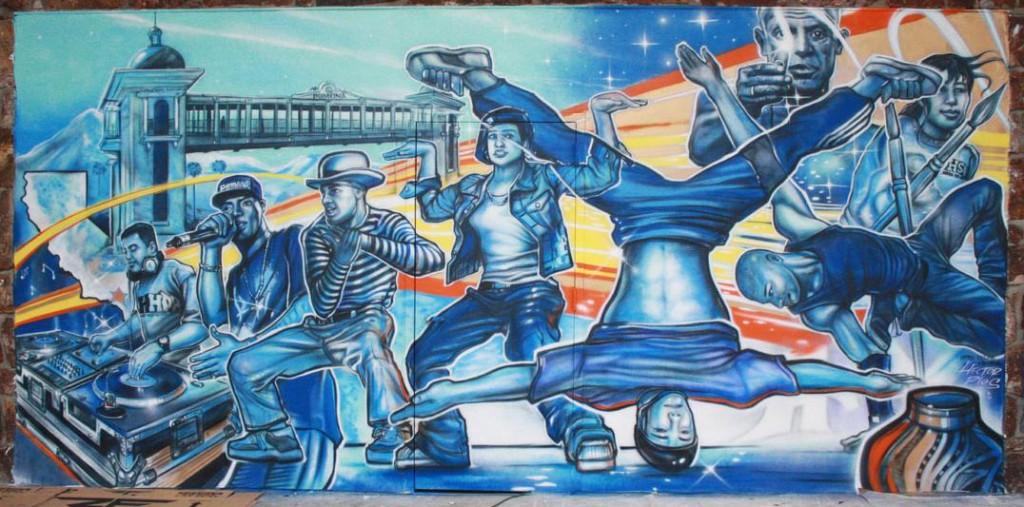Historic Happenings: The History of Hip Hop

From the moment hip-hop was introduced to the cultural zeitgeist, it rapidly changed the history of music forever and remains an avenue of culture and creation. With infectious beats and profound lyricism combined, hip-hop has played an integral role in bringing communities together. All month long, you may have seen celebrations commemorating the 50th anniversary of the genre. Today, let’s take a stroll down a musical memory lane as we examine this rich history on the anniversary of hip hop.
To understand the role of hip hop in society, one must first understand the conditions in society which resulted in its emergence. In the 1970s, many of America’s urban centers were enduring financial hardship and social discontent. This was especially true for the Bronx, ground zero for the evolution of hip-hop. However, despite these hardships, communities were looking for a way to come together and celebrate with one another. These efforts resulted in block parties in NYC which featured DJs, who would typically play genres like soul or funk. As the parties grew more popular, DJs would experiment with different rhythms and styles, unknowingly pioneering the genre that would change music forever.
After years of research, experts have determined that there are four pillars of hip-hop music: DJing, rapping, graffiti painting, and break dancing. Far beyond just a musical genre, in many ways, hip-hop was a full-blown social revolution. Combining elements of music, dance, poetry, and more, hip-hop represented a fusion of ideas that had never before come together in this way. As the years began to march on, it became evident that hip-hop was here to stay, and with its success came decades of artist innovation.
In 1973, DJ Kool Herc introduced the break-beat, an iconic percussive technique that quickly became central to the formation of the genre. By employing these freestyle techniques, improvised vocals, etc., these early DJs were laying the foundation for how the genre would continue to evolve over the next several decades. As hip-hop began to take shape, it grew more popular and by extension, began to gain traction in other parts of the nation. The Sugarhill Gang, a trio formed right here in New Jersey, is credited with releasing the first hip-hop record, “Rapper’s Delight”. The album quickly swept the nation, climbing the Billboard charts and making the top 40 for the first time in history. This album brought hip-hop into the spotlight, catapulting the genre into broader market success.
By the time the 1980s rolled around, hip-hop was officially on its meteoric rise to success. Not only was hip-hop an entity in and of itself, it also began influencing other genres of music. For example, in 1981, Blondie’s Rapture combined singing and rapping, making it the first song with a hip-hop influence to hit the pop charts. The 80s also brought about a number of hip-hop icons that are still highly influential today, including Run DMC, Tupac Shakur, The Notorious B.I.G., Snoop Dogg, and more. The late 80s to early 90s is often considered the golden age of hip hop, and with such an incredible emergence of artists, we can certainly see why!
As the 90s continued, society would see the emergence of artists like Jay Z, Lil Wayne, Eminem, DMX, and other icons. It was during this decade that hip-hop fully entered the mainstream, earning its rightful place among America’s reigning cultural institutions. In 1995, the Grammys introduced the award category for Best Rap Album, which was first bestowed upon Poverty’s Paradise by Naughty in Nature. In the 2000s and beyond, hip hop and rap continued to evolve, earning its place as one of the most popular genres to date.
Like so many elements of popular culture, hip hop must be credited to the Black and Latino innovators who were responsible for bringing the genre to life in the first place. When we reflect on these achievements and what it has meant for broader society, it is integral that we credit those who, despite systemic barriers, managed to pave the way for the next century of music in the United States and beyond. As we celebrate 50 years of hip hop, may we not just celebrate the music, but celebrate the people who made it possible. Hip hop is a vital aspect of culture both here in Trenton and all throughout the nation, and so today and every day, may we raise a toast to these pop culture pioneers.
SOURCES:
- https://www.masterclass.com/articles/hip-hop-guide
- https://www.kennedy-center.org/education/resources-for-educators/classroom-resources/media-and-interactives/media/hip-hop/hip-hop-a-culture-of-vision-and-voice/
- https://www.sandiegouniontribune.com/entertainment/music/story/2023-08-06/hip-hop-history-a-timeline-of-key-events
- https://www.britannica.com/art/hip-hop
- https://blog.prepscholar.com/hip-hop-history-timeline
The post Historic Happenings: The History of Hip Hop first appeared on TrentonDaily.
Powered by WPeMatico

